Their Majesties the Emperor and Empress of Japan Met with Returned Japan Overseas Cooperation Volunteers (JOCV) and Youth Volunteers for Nikkei Communities (NJV)
2024.11.18
On September 26, representatives of the Japan Overseas Cooperation Volunteers (JOCV) and Youth Volunteers for Nikkei Communities (NJV) who had returned to Japan had the honor of talking informally with Their Majesties the Emperor and Empress of Japan at the Imperial Palace, during which they reported on their activities in the foreign countries where they had served. Since the launch of the volunteer initiative in 1965 and continuing to the present, Their Majesties have held informal talks with returnees.
The volunteers this time faced the impacts of the global spread of COVID-19, which led to temporary returns and extended stays within Japan. However, they were able to overcome the obstacles presented by the pandemic and complete their duties upon going back to their countries of dispatch.
On this occasion, seven JOCV members and one NJV member who had returned from countries in Asia, Oceania, Africa, and Latin America met with Their Majesties the Emperor and Empress of Japan. Before this informal conversation, they met with JICA President Tanaka Akihiko at JICA Headquarters in Chiyoda-ku, Tokyo.
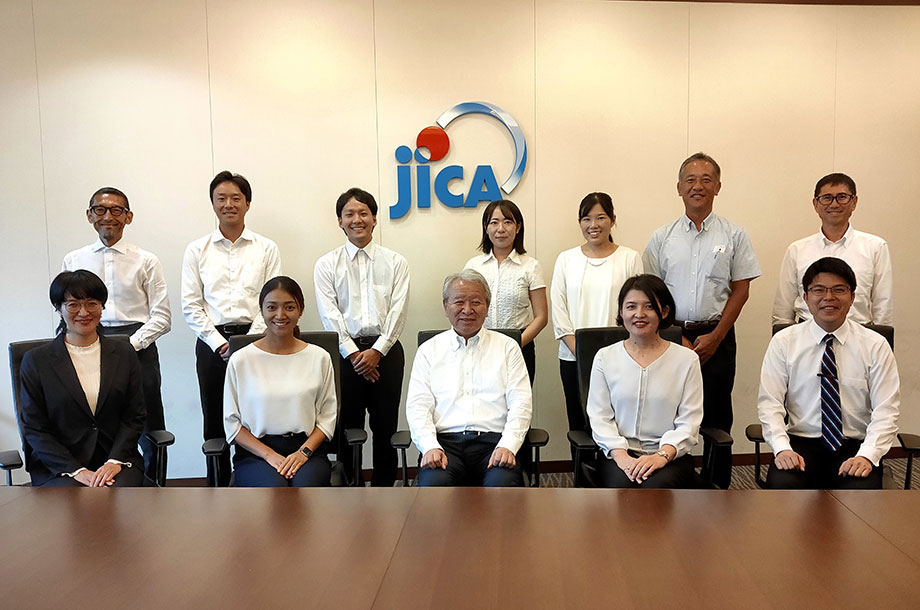
From left in the front are Ms. Beavers; Ms. Takahashi; JICA President Tanaka; Ms. Sonoda; and Mr. Hamamoto.
In the back row from left are Mr. Otsuka, Chief Secretary of the Office of the President; Mr. Sugimura; Mr. Tanaka; Ms. Shimomura; Ms. Ichikawa; Mr. Tachibana, Director General of JOCV; and Mr. Wada, Deputy Director General of JOCV
Beavers Yu (dispatched to Kyrgyz, category: design, from Kanagawa Prefecture) was assigned to a vocational training school in the suburbs of Bishkek, the capital of Kyrgyz, where she taught graphic design techniques to aspiring designers aged 15–18. Besides advertising design, she launched an art project in collaboration with local artists and students and held peace-themed exhibitions in two cities. Students also created collaborative products with local companies to improve their design skills and creativity.
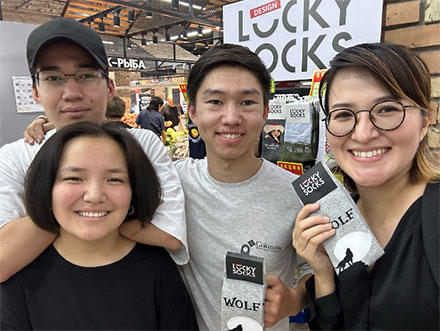
Visiting a store to see socks on sale that were designed by the students.
Takahashi Kanae (dispatched to Thailand, category: assisting children and persons with disabilities, from Fukushima Prefecture) was assigned to a special needs school for children with physical disabilities in northeastern Thailand, where she ran physical education classes for the promotion of students’ sound development through sports. Together with her colleagues, she worked to find ways to increase students’ opportunities for exercise. She also advocated for the introduction of swimming lessons, which were previously unavailable, and collaborated with local teachers on teaching methods, leading to changes such as the formation of an educational environment where swimming lessons could be independently held by local teachers.
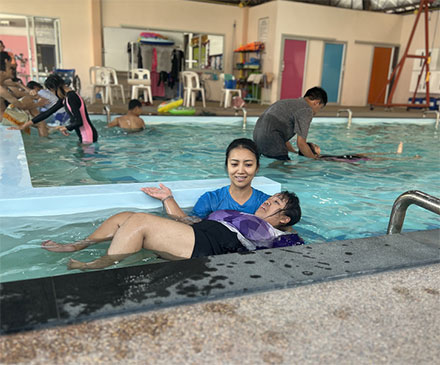
Engaging in swimming lessons in physical education after exchanging ideas with colleagues.
Sonoda Tamaki (dispatched to Palau, category: environmental education, from Kumamoto Prefecture) was assigned to the Division of Solid Waste Management, Bureau of Public Works, Ministry of Public Infrastructure, Industries and Commerce in Koror State, Palau, where she traveled around schools and communities engaging in awareness activities to promote recycling and environmental education. At a waste disposal site constructed with Japanese grant aid, she developed educational materials on waste management for visitors and conducted experiments on the decomposition of biodegradable plastic bags widely used in stores, contributing to raising awareness about local issues.
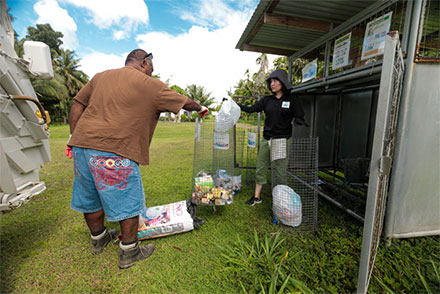
Recovering resources to encourage recycling collection and reduce discarded waste.
Hamamoto Yoshimi (dispatched to Paraguay, category: community development, from Hiroshima Prefecture) was assigned to the Business Incubator at the National University of Asunción (INCUNA) in San Lorenzo, Central Department, Paraguay, where he provided assistance to prospective entrepreneurs. To provide opportunities to learn the fundamentals of entrepreneurship, he held online study sessions, conducted outreach through a dedicated website, and created educational materials. Additionally, he conducted computer training workshops for local colleagues and helped improve work processes, contributing to the overall enhancement of services at the assigned site.
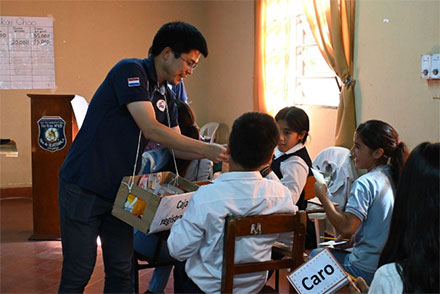
Conducting a financial literacy class for elementary school students.
Sugimura Yusuke (dispatched to Jordan, category: tourism, from Tokyo) was assigned to a historical museum in the ancient city of As-Salt, Jordan, a UNESCO World Heritage site as of 2021, to boost tourism. He worked to promote digital transformation (DX), including a social media strategy to disseminate information and the introduction of QR-code-based visitor satisfaction surveys, and devoted himself to improving the digital literacy of local staff. As a result, local staff now familiar with software and apps are able to share information via social media today, enabling the continued promotion of As-Salt’s appeal as a tourist destination.
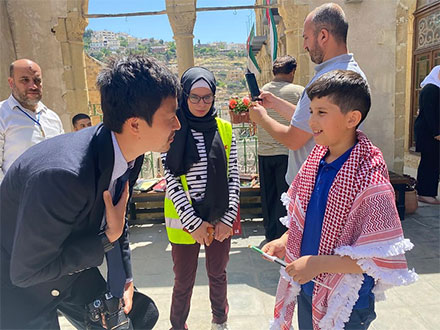
Taking photos to post on the tourism bureau's social media pages.
Tanaka Sho (dispatched to Rwanda, category: community development, from Kyoto) was assigned to a coffee farmers’ cooperative in Karongi, Western Rwanda, where he contributed to revitalizing the coffee industry through group activities for young farmers and coffee tourism. Specifically, he led a model farm initiative to encourage young farmers to enter the coffee industry, established new sales opportunities for growing coffee market share, and organized tours in partnership with hotels and travel agencies, thereby supporting the growth of local coffee tourism.
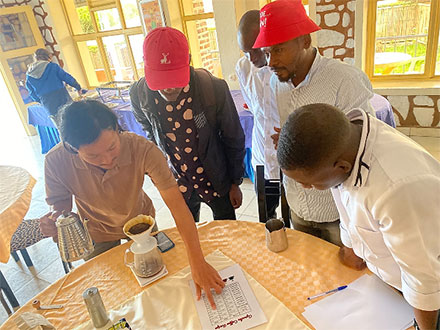
Lecturing hotel staff on how to brew coffee
Shimomura Sachi (dispatched to Gabon, category: midwife, from Nagano Prefecture) was assigned to the Maternal and Infantile Health Center of Akebe in Libreville, the capital of Gabon, where she held maternity classes, promoted postnatal examinations, conducted educational activities on unwanted and early pregnancies. Initially, the number of participants in postnatal examinations was low and the health center was not fully operational. However, by creating a system allowing mothers to receive postnatal examinations after infant checkups, she increased opportunities to monitor maternal and child health, boosting the number of examinees.
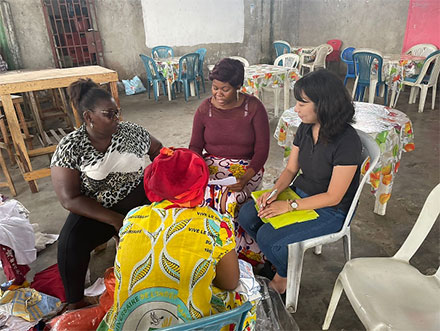
Conducting awareness activities on unwanted and early pregnancies.
Ichikawa Rina (dispatched to Brazil, category: elementary school education, from Aichi Prefecture) was assigned to a full-day combined elementary, junior high, and senior high school in Manaus, the capital of Amazonas State in northern Brazil, where she taught Japanese and introduced Japanese culture. She worked with local colleagues to teach origami, traditional yukata dressing, the kendama wooden skill toy, and calligraphy, as well as the traditional Japanese Soran Bushi dance. She also created educational materials on Japanese traditions such as karuta playing cards, sumo, and summer festivals, in addition to contributing to updating Japanese textbooks.
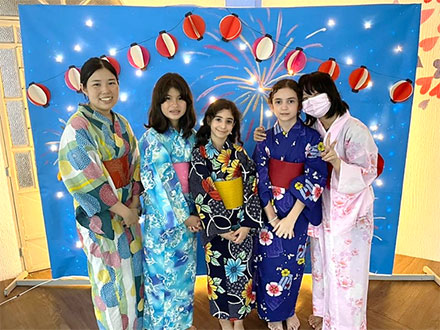
Introducing the Japanese culture of summer festivals to elementary school students and dressing in traditional yukata.
Following the meeting, the participants shared their impressions with comments such as “I was deeply moved by how attentively Their Majesties listened to our activity reports,” and “Their words of encouragement have inspired me greatly for the future.”
scroll